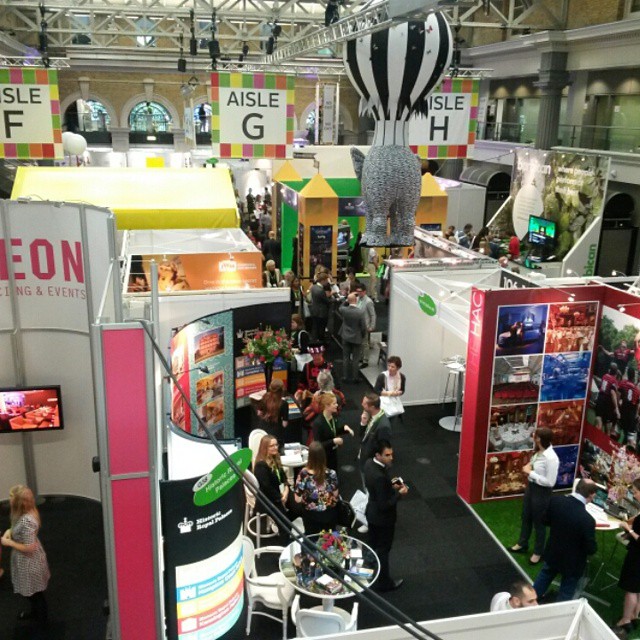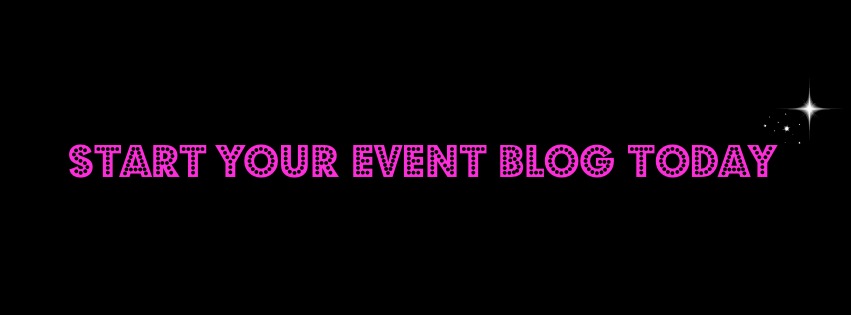Last Tuesday I hosted #EventPlannersTalk LIVE event, based on the weekly Twitter chat, bringing the online community into the physical space. A quick introduction what #EventPlannersTalk chat is – it is an online community on Twitter for global event professionals and every Monday I host a Twitter Chat about current industry topics. #EventPlannersTalk LIVE event aims at bringing the online community into the physical space to continue share ideas, best practice, experience and network face-to-face, extending event life-cycle and making it a 365 days event!
The first live event took place in February and was about “how to promote events using social media”. This time the event was about “How to grow your event business with blogging” and I had the pleasure to welcome both bloggers and suppliers to share their thoughts and experiences. While event blogging is still a niche and it will take some time until it will become as big as fashion, food, travel and lifestyle blogging, it is becoming more and more popular, more and more freelancers and companies start blogging as a way to communicate with their audience and build social media presence.
Seeing how dynamic this industry is and the growing interest in social media and blogging, it was the right time to host a session about it and invite both bloggers and suppliers to have an open discussion, share tips and experiences over delicious canapés and drinks at the trendy Amber Bar, which is part of the Late Night London Group.
Having a personal or corporate blog has many benefits. First of all it is a tool to promote your business, same as you would use Twitter, LinkedIn, mailing or any other online tool. It gives you the opportunity to express your thoughts without any limit of characters where you can combine text with images.
Secondly it allows you to “break the news” on your own blog. If you are experienced with sending press releases to an industry magazine, you know that they won’t share the news the way you want it, they will change the wording and might omit information you find important. Therefore sharing the article on your own blog guarantees your message will come across as you want.
Thirdly, having a blog will help you to drive traffic to your website and improve your SEO. When you often write about venues, suppliers, catering etc. google will show your article when potential clients are looking for these same words. Plug-ins like Yoast can help to improve your SEO.
Forth, having a blog is great for networking. Many suppliers, event professionals and event bloggers I know today is thanks to the blog. We met online and keep seeing each other at events and keep the conversation going on social media.
Fifth, having a blog builds your personal brand and can position you as a thought leader in the industry when you are consistent and can show industry expertise.
Last but not least, blogging can be an additional source of income and there are different income streams. You can place AdSense, sponsored posts, sell event tickets, get speaker engagements and more.
Starting a blog is not easy but it is very rewarding when you see how it grows and becomes a voice in the industry. It requires some IT skills but also that you think creatively and out of the box on a daily basis. You will need to test before you get it right and stay on top on latest developments, especially with social media.
As you know from the Twitter chat, each week we have 5 – 7 questions to discuss and this time the event had a similar format, but face-to-face.
In the following are the questions and key discussion takeaways.
Q1: What makes an outstanding event blog?
Firstly, the content needs to be something that people can relate to. Secondly, presenting an opinion, that might be slightly controversial but has a reason to backup, and even make the reader to change his. Many blogs today write about a fact, but don’t say why it is so. Everyone has their own opinions and ideas but it is important to explain and make the reader understand writer’s point of view.
Q2: How event bloggers can establish partnerships with suppliers and sponsors?
Sponsors want to see what they will get out of it, therefore they need to prove to themselves what the return is on making a deal with a blogger. If the blogger wants to cover the venue, the venue will be happy for him/her to do so but want to know what they are getting out of it in terms of bookings, inquiries, site-visits to justify the investment. There must be a justification that there was an interest generated in the venue thanks to the blogger. In general venues are interested in collaborations with bloggers, as it is almost as free advertising but would expect to discuss such partnership first and agree on terms and conditions and what to expect.
Is there a way to measure it?
Bloggers have difficulty in determining how many clicks their post led to suppliers website and if led to future bookings. Bloggers can only report on the traffic to their site, the rest is determined based on “who picks up the phone and how the venue handles the enquiry”.
But how long venues are ready to wait before seeing returns?
In general, measuring ROI of a blog might take longer than of an exhibition. The blogger might post occasionally about the venue and suddenly the opportunity is there for someone to book. Working with bloggers is a way for suppliers to stay relevant.
General feeling is that many suppliers want to see ROI instantly and therefore it is hard to justify ROI on social media. Because of that they are protective and reluctant using social media. On the other hand why to be concerned with ROI and tracking where customers are coming from – when thousands of people read the blog and suppliers branding is there – this is branding. Whether a booking took place or not is not the only indicator as the branding took place, the message came across and that might resonate at a later stage when potential customer sees the supplier thought another channel. Brands need to make sure they always stay relevant. Everyone knows about coke, but why do you know about coke and when did first you learn about it? This is branding and event suppliers must be aware of it.
Do partnerships between bloggers and suppliers really work in this industry?
We should look at it less as a partnership but more of a relationship, as possible partnership might hinder business opportunities, for example when there are competing suppliers. Suggestion for bloggers is to partner with associations, because they are non-for-profit and can benefit both the blogger – providing excellent content, and the association – getting exposure. It is not a commercial partnership.
For many venues, meetings & events is only a small part of what they do and therefore they don’t see necessary promoting the venue through event bloggers but via other marketing channels and activities targeting the leisure market, to create buzz, awareness and generate word of mouth. Suppliers might even consider targeting non-event bloggers, such as travel, fashion or food, depends who their target audience is and the message they want to bring across. Suppliers that blog might have the advantage of reaching out to people outside the events industry who are looking for their product or service.
Q3: How event organisers, sponsors and suppliers can benefit from working with bloggers?
Bloggers create chatter on social media so people start talking about your product or service. Suppliers can benefit when bloggers post photos, get retweets from attendees and clients and drive knowledge. When it comes from someone the followers trust they might visit the place in the future.
Bloggers have the ability to increase awareness faster about properties and get instantaneous shares, especially in a city like London where there is so much on offer.
Lastly, blogger’s content is much more personal and people trust the blogger more than an advertisement.
Additionally, there are benefits for corporates who don’t have their own blog to write for other blogs. It is a way for them to share their knowledge but at the same time what their company does. Not every events company needs a blog. There are many good opportunities to share on other blogs or write for industry press.
Even if bloggers don’t get paid for writing an article, they are in a good position to choose which event they want to attend and write about. They will not accept an invitation just for the sake of “getting content”. Many companies and PR agencies don’t understand that mechanics and assume because they have some content the blogger will be willing to write about. It is challenging for bloggers to work with PR agencies because agencies want to have control over the content and while they are paid on behalf of the client, they don’t pay bloggers to blog when they invite them. PR agencies need to understand that the difference between working with a blogger and a trade magazine is that bloggers create a story around a certain product or service, while magazines work with press releases they get from the PR agency.
Q4: How to build and maintain loyal readership and high engagement rates?
In order to build and maintain loyal readership bloggers need to post regularly and engage with their audience on a daily basis, 2 – 3 times a day on Twitter.
General feeling among event participants was that the industry has low engagement rates online. As an industry there are not many comments on news, except specific topics, such as the importance of event management degrees, a topic that generated comments from academics, students and professionals. Participants suggested that they read industry news but will rather “share” than comment or start a conversation about an article. As an industry, we feel that event professionals prefer expressing their opinions better offline.
But on the other hand, many event professionals are interested to know opinions shared in the comment section of an article, opinions that they are not paid for to share and to see the different opinions. There are rarely comments on any industry news.
Reason for it might be perceptions, people don’t want to share because they are afraid how others will perceive them but they want to have an open forum where they can be honest without being judged.
Some companies have very strict social media policies and advise to their employees not to post anything religious or political on social media. Therefore, people are careful sharing on behalf of their organisations as that might have major consequences on their jobs.
Thank you everyone again who attended and engaged on Twitter. Lots of takeways from this discussion, both for bloggers and suppliers and if you have anything to add please share in the comment section below.
Was great experience being able to share thoughts and opinions in more than 140 characters and develop the conversation beyond the initial question.
Big thanks goes again to Late Night London, Evolero and Tweetwall Pro who supported this event!
Venue: Amber Bar
Pictures:














